Could You Repeat That? Getting the Gist of the Language Along the ICW
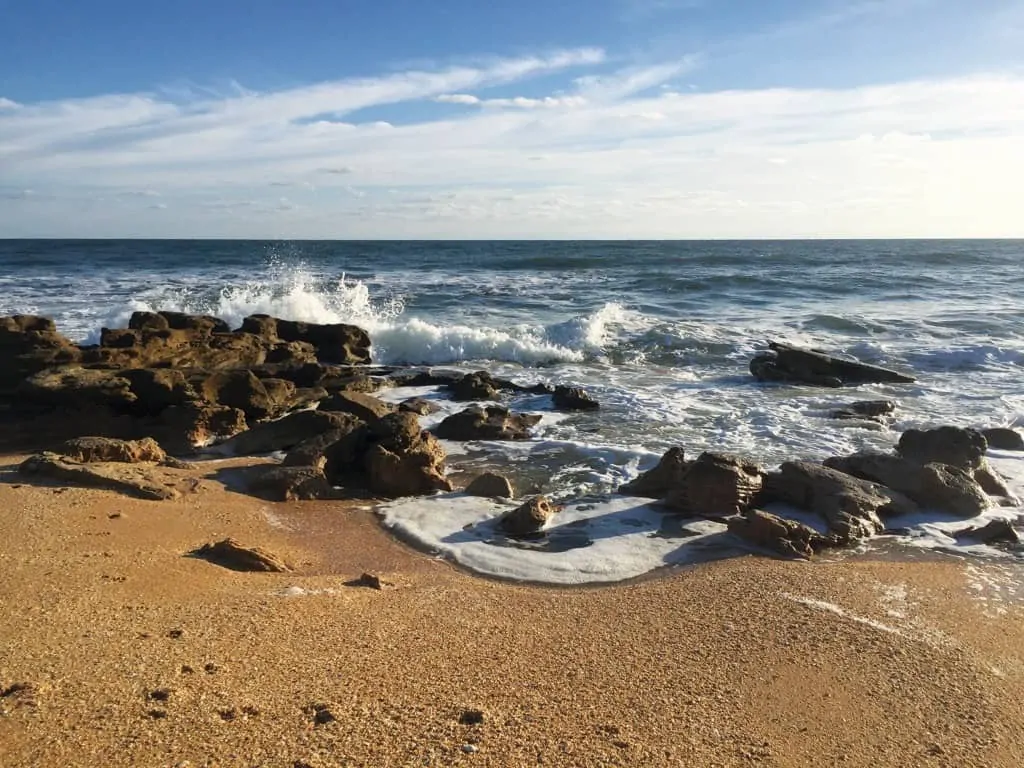
This morning, I woke up to the sound of waves breaking against the shore, and tonight, I’ll fall asleep listening to the same thing. That’s why I come to Marineland, just south of St. Augustine, one of my favorite stops on the Intracoastal Waterway. Here, I can lie in bed, in a well-protected slip and listen to the ocean roar.
Sammy and Bindi, the ship’s dogs, think we come here so they can run berserk up and down the beach, clambering up and over the coquina boulders on the sand. And, yes, that too. We’ll stay here a few weeks, then continue down the Florida coast, crossing the Okeechobee Waterway to the Gulf Coast, where we’ll spend the rest of the winter before reversing the process in the spring.
It’s a near-religious rite of snowbirdness that is performed by hundreds, maybe thousands, of cruisers every year. The destinations and stops along the way may differ; the experiences are both shared and singular. I’ve done this a bunch of times now, an almost ludicrous number it seems, yet each time it’s both reassuringly the same and refreshingly different.
This year (so far, I hasten to add) has been uneventful, with a couple of small exceptions, one of which I’ll tell you about in a moment. Last year about this time, I wrote about how the difficult stretches along the ICW are what make it interesting. Well, what was interesting this time is that nearly all of those stretches have since been dredged.
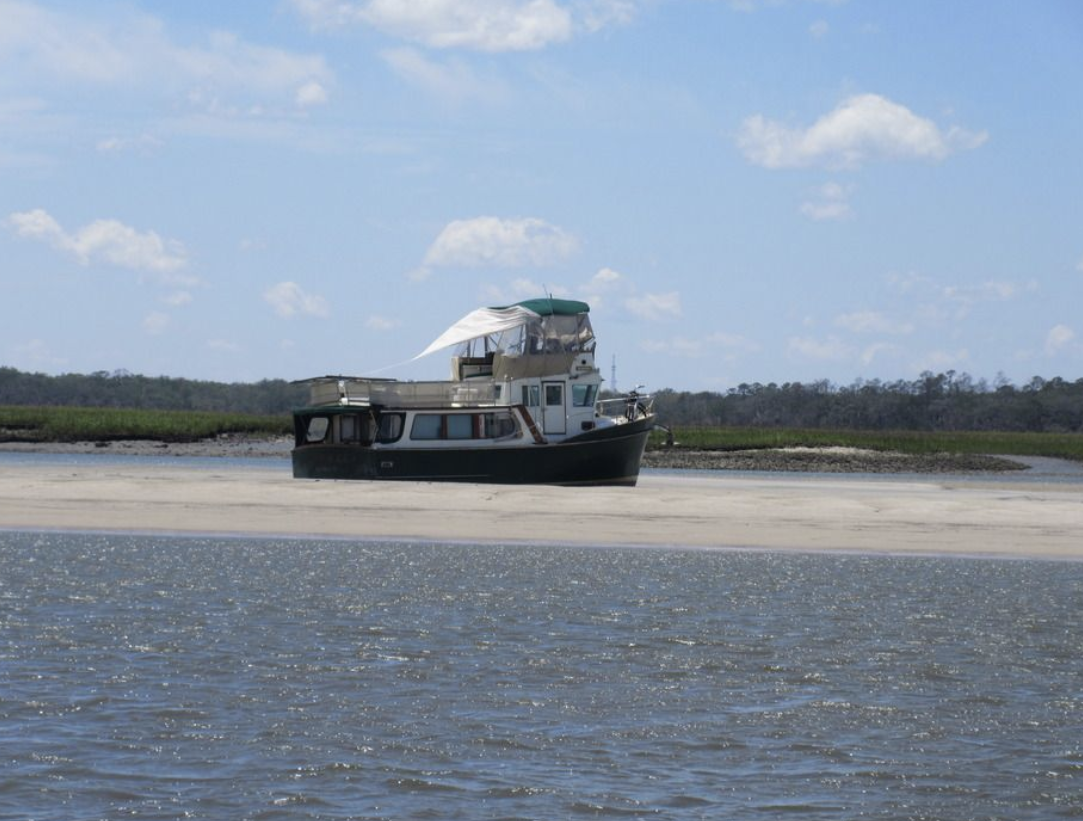
Hell Gate. Jekyll Creek. Even the wicked stretch south of Jeremy Creek, SC. They’re all pussy cats now. Only Little Mud River remains, and even at low tide, that one is doable with even a five-foot draft. I nearly ran aground on the south end because I was talking on the phone, but that was my own fault. At troublesome Matanzas Inlet in Florida, the dredge is still working, but I’ll get to that in a minute.
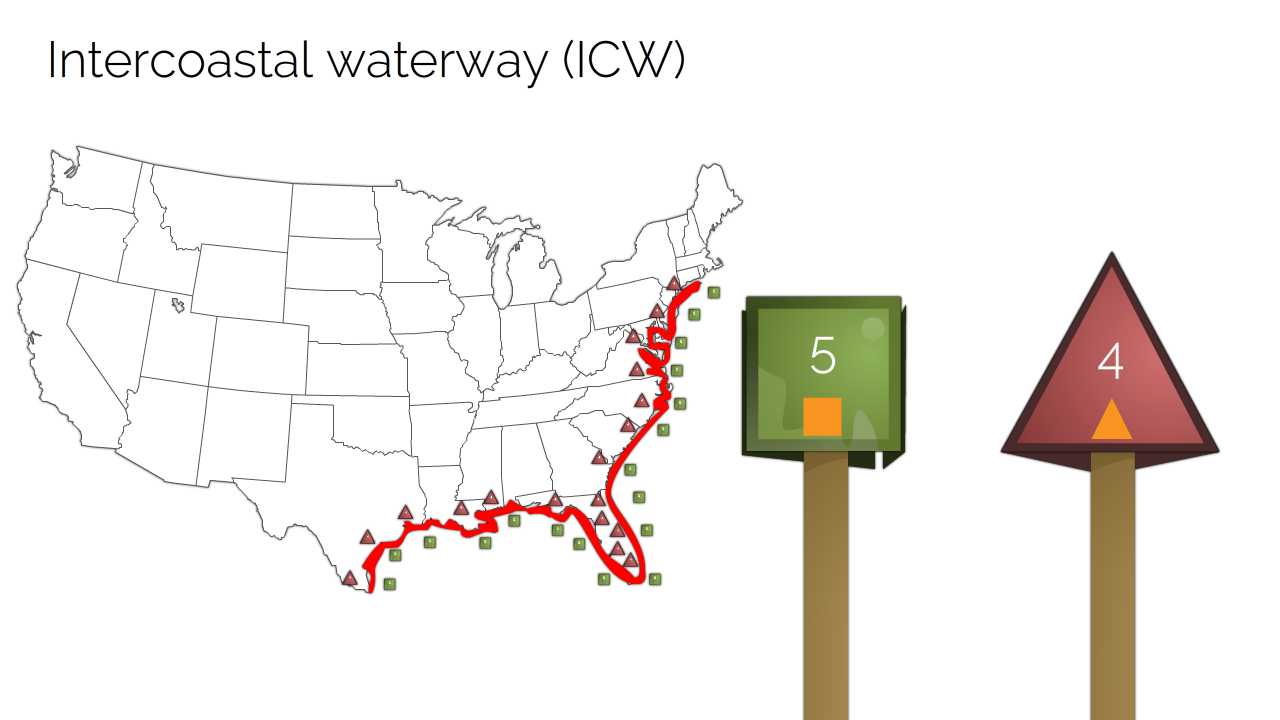
Most of the remaining challenge involved, as it always does, weather. Even on the ICW, you don’t want to get caught out in an exposed position with bad weather coming, so you set up for a safe place to ride out the storm.
In my case, this year, those safe places were Hampton Va., Surf City NC, Brunswick Ga. and Marineland. And against all the rules of good boating, I had the added task of getting to New Bern from Hampton by a certain date, so I could drop the dogs at a kennel, pick up a rental, and drive to Florida for a memorial birthday party I couldn’t miss and then back the next day, pick up the dogs, drop the car and get back to the trip.
I was lucky. After a long trip down from the Alligator River, I was a couple of hours from New Bern and heading up the Neuse River into a north wind as the daylight faded and the Sun dropped below the horizon. Happily, the Sun took the wind along with it, and I made the last dozen miles over an utterly still river, threading my way through the darkness along the channel and under the bridges to the marina. Those were some of the loveliest few hours I’ve ever spent on the water.
Of course, it doesn’t always work out that way. Winding through the Georgia marshes, I decided to try out Wapoo Island for the night. I left the ICW just before Sapelo Sound and worked up the Wapoo River around the west side of the island.
There, I anchored far away from the one other boat in the anchorage as the wind whistled from 15 to 20 knots and the current ripped through at a couple of knots. As the last light faded, a third boat came in and anchored unnecessarily close behind me. The wind stayed up all night, and all of the boats—six by morning—sailed restlessly at anchor. It was an uncomfortable night. Wapoo may be a fine anchorage, but I’ll never be back.
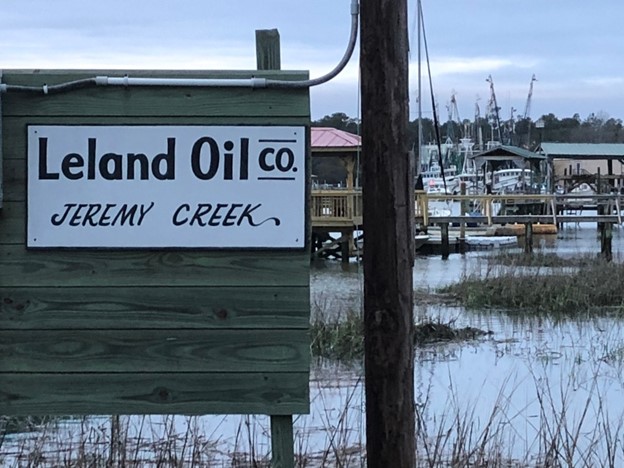
On the other hand, there are places I come back to nearly every year: Leland Oil Co. in McClellanville SC, Church Creek south of Charleston, Osprey Marina or any of half-a-dozen anchorages on the Waccamaw River, and any place in Hampton. And there are some places that turn out to be perfect at just that moment but may never be as good again. One of those this year was the elegantly named Lord Baltimores Bay on the Patuxent River.
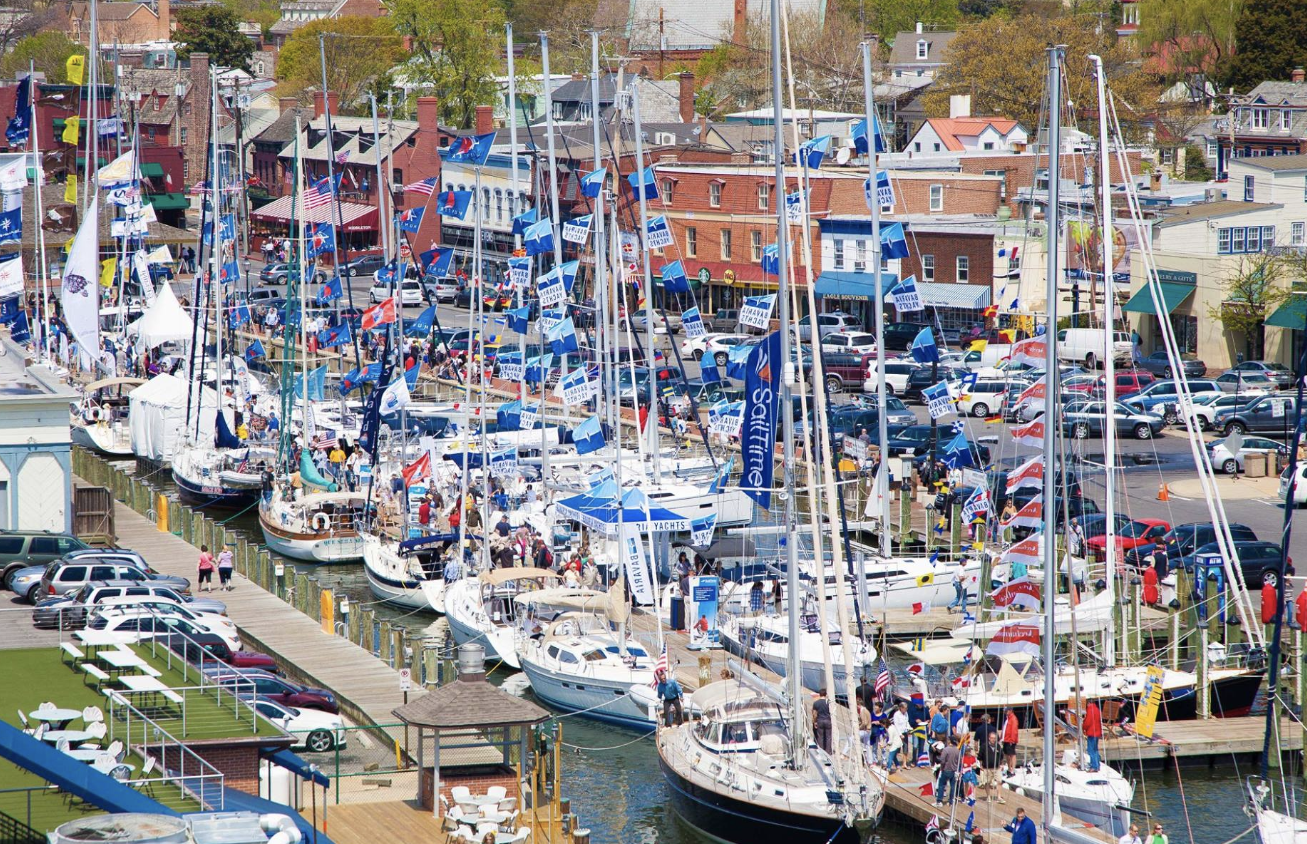
With bad weather in the forecast, Moment of Zen and about 425 like-minded boats headed south on the Sunday of the Annapolis sailboat show.
That afternoon, 420 of them decided to stop in Solomons. I had planned to as well, but I changed my mind, turned my back on the entrance to Solomons, and headed south until I was just east of the entrance to the Naval Air Station’s West Basin Marina. There I dropped the anchor in 11 feet and had an undisturbed though drizzly night and an easy exit the next morning at first light. It would be a terrible place to be in almost any kind of winds, but for that night, it was perfect.
So now we come to the Matanzas Inlet incident. Matanzas, which means “massacres” in Spanish, by the way, is a North Carolina-style, shoaly, shifting section of the ICW located between St. Augustine and Marineland. It has to be dredged every few years, and this year was one of them. In November, when I arrived at low tide (naturally), the dredge was still working, which meant that some of the channel was deep and some was still shallow and none of it was marked yet.
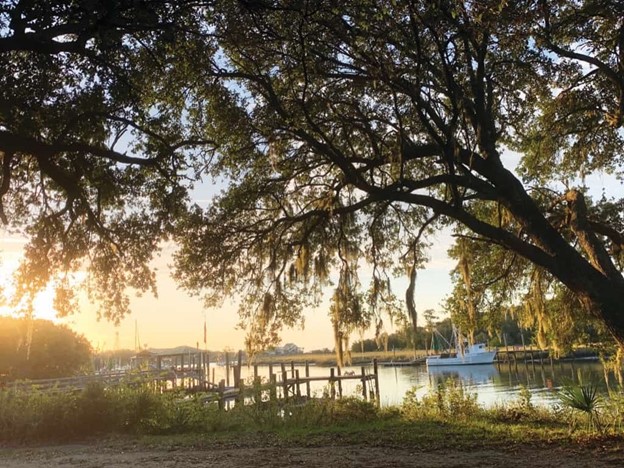
The first order of business in these cases is to raise the dredge operator. This one answered only on channel 13, having for some reason stopped monitoring 16 some time ago. You just have to divine that. When you finally get the dredge operator to answer, you find that he gives directions only in what is apparently Welsh, a Brittonic language of the Celtic kind. (I pick that out at random; it could be Urdu.)
After several requests for more clarity, and after many long silences, the gist I finally got was: “Pass me starboard to starboard.” Good information to be sure, but I’m here to tell you that it’s not enough to get you through, as dozens of boats before me have learned to their peril. But the gist is what you have, so the gist is what you go with.
I slowed down, which caused Sammy and Bindi to perk up because they thought we were about to anchor and started along what I hoped was the channel. I passed the last red buoy and then set out around the dredge, aiming to pass outside the yellow floating can, as is customary.
Twenty yards in, I ran aground. That caused the dogs to think we had dropped anchor, so they ran up to the foredeck and started to play, which is the normal routine. I immediately threw the engines hard into reverse and tried to reopen negotiations with the dredge operator, while trying to explain to the dogs that anchoring and running aground, while both resulting in a cessation of forward progress, were not the same thing and that they needed to come back immediately and get into their traveling positions.
Sammy and Bindi responded, but the operator didn’t. By this time, I had backed up to the red buoy and was trying to hold Zen against the current until I could get a better “gist.”
Finally, he answered. I explained that what I had thought he meant hadn’t worked out, so maybe he could be a little more detailed in his directions. He responded with a string of Welsh. I attempted a translation back to him. He responded with some additional Welsh, and so forth until, finally, I felt I had begun to get the real gist, which was, essentially: Stay close to the final red marker then head directly for the dredge, hugging the western shore, then pass the dredge so close to starboard that I could hand you a cup of coffee out the window, and stay inside the floating yellow can that every ounce of your experience tells you to pass on the outside. “Is that right?” I asked. “Ie,” he replied. So that’s what I did, and this time got through with plenty of water. “Yay!” I said. (I have to point out here that this is a play on words, because both are pronounced roughly the same.) Half an hour later, Moment of Zen was tied up in the slip at Marineland, and I could hear the roar of the ocean.
And since this is where I started this column, it’s also where I’ll end it.
CBM Cruising Editor Jody Argo Schroath, with the help and not infrequent hindrance of ship’s dogs Bindi and Sammy, goes up and down bays, rivers and creeks in search of adventure and stories.